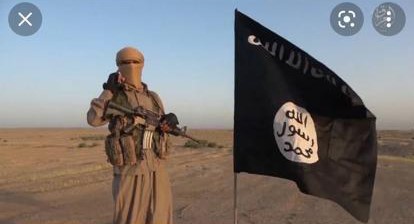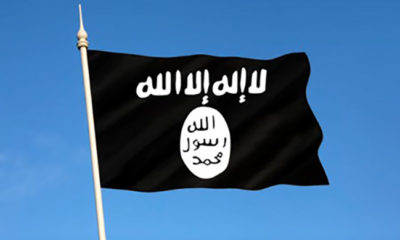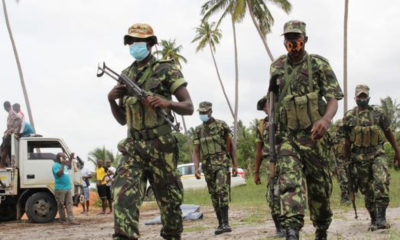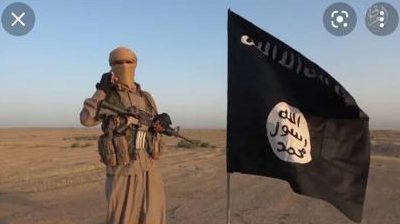
News

US sanctions reveal local terror financing network
Three men, two of whom are based in South Africa, were named by the United States (US) treasury this week in association with activities linked to Islamic State of Iraq and Syria (ISIS) on the African continent.
Abubakar Swalleh, Zayd Gangat, and Hamidah Nabagala have been designated – in other words, sanctioned and no longer able to do business with the US – bringing the number of those designated from the African continent, mostly from South Africa, to 12.
It’s further proof that terror financing has become an issue in South Africa, with increasing evidence that ISIS supporters and domestic-terror activists are involved in funding terrorism locally and internationally.
“Since the 7 October attack against Israel and the resultant war, ISIS, looking for relevance, has capitalised on growing levels of anti-Zionism and antisemitism, using its official and unofficial media platforms to encourage attacks against Jews across the world,” said Jevon Greenblatt, the director of operations at the Community Security Organisation (CSO).
South Africa has a long and “concerning” history of ISIS-linked activities, he said.
He mentioned a few, including the Thulsie twins’ plot to attack Jewish targets in 2016; the murders of Rodney and Rachel Saunders in 2018; the attack on a Shia Mosque and placement of incendiary devices around Durban in the same year; the New Year’s Eve shootings across Johannesburg in 2020; and the threat against the Gay Pride parade in Sandton in 2022.
The three men have been added to the US sanctions list as part of its efforts to clamp down on the emergence of South Africa and other African countries as key places of ISIS resurgence.
According to the treasury, these individuals serve as “key financiers and trusted operatives”, enabling the activities of ISIS and its leaders across Central, Eastern, and Southern Africa.
They also serve as critical links between far-flung ISIS operations, including ISIS affiliates in the Democratic Republic of the Congo (DRC), Mozambique, Somalia, and ISIS cells in South Africa, allowing ISIS leadership to leverage each affiliate’s capabilities to conduct terrorist attacks that undermine peace and security in the region.
“South Africa has been at the core of global terrorist financing for more than two decades,” said Professor Hussein Solomon at the Centre for Gender and Africa Studies, University of the Free State.
“This isn’t new, and we have done nothing. Our international partners are exasperated with us. The bottom line is, we don’t have the capacity or the political will to stop it. Stopping this financial support to terror groups means shutting off money laundering for corrupt elements within the state.”
According to the treasury, Swalleh is a South Africa and Zambia-based ISIS operative. He’s allegedly involved in the physical transfer of funds from South Africa to the DRC. Additionally, Swalleh facilitates the movement of ISIS-affiliated individuals from Uganda to South Africa, and vice versa.
Mohamed Ali Nkalubo, a DRC-based ISIS commander previously designated by the state department in December 2023, allegedly relies on Swalleh to move funds and recruit members for ISIS’s DRC affiliate.
Swalleh moved to South Africa under Nkalubo’s direction, where he has been involved in robberies and kidnapping for ransom.
Zayd Gangat is a South Africa-based ISIS facilitator and trainer according to US treasury. ISIS leaders in South Africa have historically used robbery, extortion, and kidnapping for ransom to generate funds for the group.
DRC-based Hamidah Nabagala serves as an intermediary for ISIS financial flows in Central Africa. Additionally, Nabagala has been accused of funding the October 2021 Kampala bombing, which killed one and injured at least three others. In 2021, Ugandan authorities arrested an ISIS operative that had received funding from Nabagala. She also sought to smuggle her three children out of Uganda to send them to ISIS-affiliate camps in the DRC.
In March 2022 and November 2022, the US treasury targeted ISIS’s efforts to expand operations and raise funds on the African continent with designations of South Africa-based ISIS operatives, financial facilitators, and their business networks.
“South Africa’s National Terrorism Financing Risk Assessment for 2024 is correct in stating that South Africa is considered to be a hub or transit point for financial flows between terror suspects in the region,” said Solomon.
“The international community is willing to help us, but we don’t have the political will to deal with it. Then, there’s the entanglement between organised crime and terrorist groups, which makes it difficult. Two reports on our intelligence services show how politicised and factionalised it is.
“There are recommendations, and we know what to do to fix things, but our security services are incompetent and politicised. We need a truly new government not a Government of National Unity with the African National Congress still there, which goes to the heart of the problem,” he said.
Greenblatt said Africa had become a primary front for terror organisations such as ISIS and Al Qaeda.
“ISIS has a well-established and interconnected network of cells and individuals across Africa, including within South Africa, and aims to establish an Islamic state throughout the continent.
“ISIS’s decentralised command structures encourage the various cells and individuals to take matters into their own hands. In some cases, this involves funding, recruiting, and training for groups and activities in other countries, but in many instances, it means planning and preparing for terror operations within their home country.
“Much of ISIS’s media structure is aimed at inspiring lone-wolf style attacks on ‘home soil’, so we can conclude that some of the funding, recruitment, and training is being dedicated to activities in South Africa. The nexus between terror groups such as ISIS and organised crime in South Africa, together with factors like poverty, inequality, and social exclusion, fuels an environment where radicalisation and terrorism can thrive,” he said.
Since the Financial Action Task Force’s grey listing of South Africa due to deficiencies identified in the country’s anti-money laundering and the combatting of the financing of terrorism (AML/CFT) regime, there has been a concerted effort to address these deficiencies by the South African authorities.
“The question remains whether this is too little, too late. Only time will tell if these efforts have a positive effect in combatting radicalisation, extremism, and the proliferation of terror groups and ideologies within the country and the continent,” said Greenblatt.
“The action this week underscores the crucial work of the Counter ISIS Finance Group [CIFG] and the importance of effective information sharing among coalition countries to target ISIS’s facilitation networks,” said Brian Nelson, the undersecretary of the treasury for terrorism and financial intelligence.
The CIFG is a working group of the global coalition to defeat ISIS and curb ISIS financing worldwide, which includes more than 80 countries and international organisations.
“While we have made considerable progress over the nearly 10 years since the establishment of this group, we must all remain vigilant because ISIS continues to develop new financial methods. The US, in close co-ordination with its key partners, remains committed to disrupting the key nodes that enable disparate ISIS groups to work together and their ability to finance the group’s terrorist activities.”











yitzchak
July 26, 2024 at 5:21 am
Interestingly but not surprising is South Africa’s non participation in The Global Coalition against ISIS of 2014. Also non participants include Mocambique,Namibia, Zimbabwe, Zambia.Eswatini.(Even Yemen and Afghanistan are members)
The CIFG as you say is correctly a working group within the Global Coalition to defeat ISIS.
South Africa so vociferous in international spheres, absented itself in the fight against ISIS which is on our doorstep and infiltrating RSA.
Who are Isis’ bankers in RSA? They are clearly under the radar of our banking system